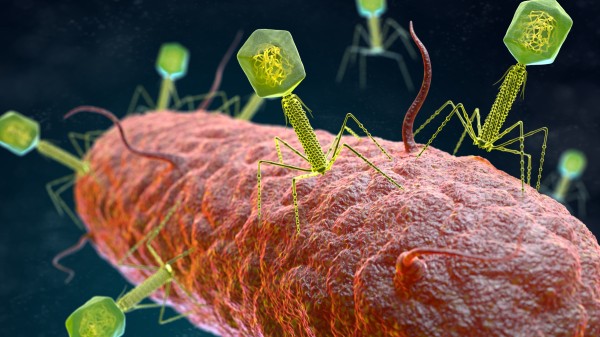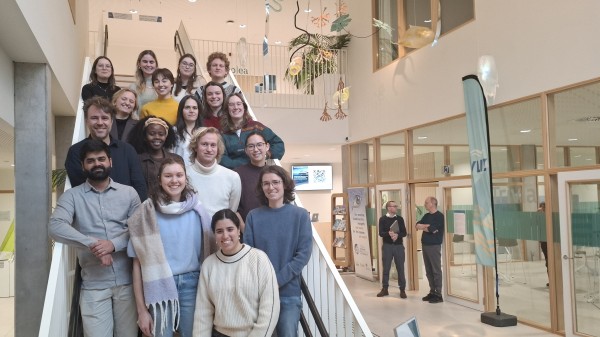VLIZ is pleased to welcome a new group of PhD researchers to our research community. These eight doctoral candidates are each undertaking important projects that address key issues in marine science. Their work will enhance our understanding of the ocean and coastal environments, while contributing to solutions for today’s environmental challenges. From studying microplastics and climate change to exploring carbon cycles and ancient seafloor landscapes, their research spans a wide range of topics. Below, we provide an overview of their exciting projects and the potential impact they aim to achieve.

On October 1, 2024, we welcomed 6 of the 8 new PhD students. From left to right: Juliette Grandjean, Elias De Craene, Maurie Keppens, Warre Dekoninck, Evert Lambrechts, and Annika Eske. Wyona Schütte had already begun her research earlier. Maqbool Ahmad will start his research later this year
Plastic pollution in a changing marine environment
Juliette Grandjean
This research focuses on the combined effects of microplastics and stressors from global changes (warming, acidification) on marine invertebrates across multiple generations. The aim is to assess individual and multigenerational responses, as well as the interactive and cumulative effects of these stressors. Additionally, the study aims to provide data for future risk assessments. The project addresses the limitations of current microplastic risk evaluations by considering multigenerational and combined stress effects. This PhD research is being conducted in collaboration with Gent University (UGent).
Blue psychology
Elias De Craene
Research suggests that exposure to natural environments energizes people and contributes to better mental health, fewer illnesses, and longer life expectancy. But what are the underlying emotional mechanisms driving the relationship between coastal exposure and well-being? This PhD research focuses on understanding the emotional impact of coastal landscapes on individuals and exploring the emotion-regulating effects of coastal exposure. The research is being conducted in collaboration with several Flemish universities.
Carbon cycle in coastal areas
Maurie Keppens
The ocean serves as a major reservoir for human-emitted carbon dioxide, but coastal areas and their carbon cycles remain poorly understood. The BERNARDO project, a collaboration between scientists and industry, aims to fill this knowledge gap using the Belgian North Sea as a case study. It focuses on optimizing measurements of carbon dioxide and methane fluxes and creating a high-resolution carbon budget. This will help detect human-induced changes in the carbon cycle. Maurie's PhD research combines in-situ observations and machine learning to study the inorganic carbon cycle, air-sea CO2 exchange, acidification, and the impact of extreme events such as heatwaves. This PhD research is conducted in collaboration with Ghent University (UGent).
Marine Geology
Warre Dekoninck
This research focuses on mapping and reconstructing the Pleistocene paleolandscapes of the outer Belgian Continental Shelf, their evolution over time, and their connection to adjacent regional paleolandscapes in the Netherlands, France, and the United Kingdom. Advanced acoustic techniques are used for this, including high-resolution seismic reflection profiles, ultra-high-resolution sub-bottom profiling, and multibeam bathymetric mapping, complemented by sediment cores (vibro-coring). This PhD research is conducted in collaboration with Gent University (UGent).
The history of tourism and gambling in coastal towns
Evert Lambrechts
Coastal towns played a crucial role in the rise of tourism in the 19th and 20th centuries, offering entertainment and permissive environments, including gambling. Evert investigates how gambling was integrated into coastal tourism. The research maps gambling activities, from card games on tourist trains to large-scale events such as horse races and roulette. It also explores how gambling infrastructures shaped social interactions across all classes and how seasonal tourism and mobile labor impacted the regulation of gambling. Finally, the study will focus on the evolving legal context of gambling between 1880 and 1930. This PhD research is conducted in collaboration with the University of Antwerp.
Plankton and climate
Annika Eske
This research focuses on the effects of changing environmental conditions and extreme climate events (such as marine heatwaves, oxygen depletion, ocean acidification, etc.) on phytoplankton and zooplankton communities in the Belgian part of the North Sea. Based on existing time series, new in-situ imaging technologies, and genetic approaches, large-scale observations are conducted to study past and future changes and events. This PhD research is carried out in collaboration with Ghent University (UGent).
DNA-based detection of explosive pollution (TNT contamination)
Wyona Schütte
Wyona investigates whether DNA analysis can be used as an alternative detection method to identify TNT contamination in the North Sea. DNA is extracted from known TNT hotspots, and 16S rRNA metabarcoding is employed to identify bacterial indicator species associated with this type of historical pollution. Through lab experiments, Wyona will study the biological degradation of TNT by bacterial communities. This PhD research is conducted in collaboration with Ghent University (UGent) and Kiel University (CAU).
Plankton metagenomics
Maqbool Ahmad
Plankton in the ocean contains an incredibly diverse and complex collection of microscopic organisms. These tiny life forms and their associated microbes are influenced by various environmental factors and the relationships they form with other species. PhD candidate Maqbool is examining existing data on plankton to understand how these interactions occur within such intricate communities. He is using this data to create computer models that can predict changes in plankton species under different environmental scenarios. This PhD research is conducted in collaboration with KU Leuven.


